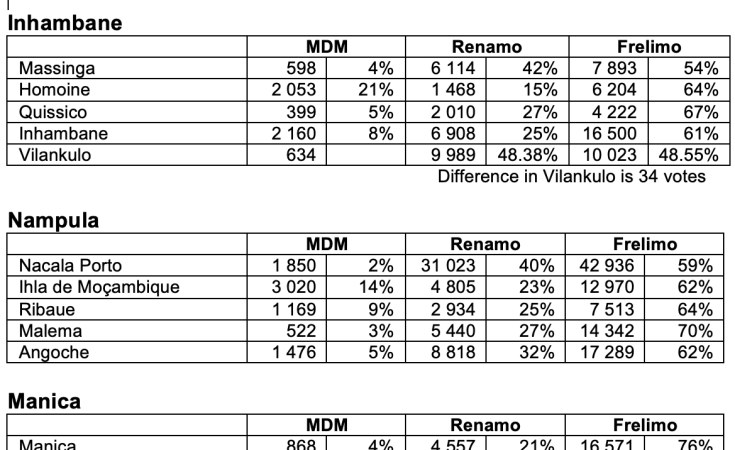"By the time of the tabulation at the polling stations, reports of irregularities were mounting up, constituting real electoral offences," admitted the National Elections Commission in a statement today.
"We will be ruthless with our members and electoral agents who have disturbed the process. That is how the law dictates. Therefore, all members involved in illegal practices will be held accountable if there is evidence of their deviant behaviour. We are referring, for example, to the reported cases of presiding officers who refused to sign the editais [results sheets]. They will have to explain themselves and be held administratively responsible," the CNE said.
The statement was read out to the press by spokesman Paulo Cuinica. In response to these irregularities, he said "under the terms of the law, the district or city courts have jurisdiction to hear appeals in relation to complaints, protests or counter-protests that are not duly satisfied at the polling station and subsequently at the district or city election commissions."
In practice, as the decisions by courts not to accept complaints in Vilankulo and Chiure showed, this is not the case. The electoral law makes it impossible to challenge the results as posted by district elections commissions (CDEs). The law (14/2018 art 140) says "irregularities in the voting and counting" must first be challenged by a protest to the district elections commission. Their decision on the protest can then be challenged in the district court. However, there is no deadline as to when the CDE must respond. But the law requires that the appeal to that decision must be made within 48 hours of the posting of the original edital(results sheet) - not two days after the date of the reply. So if the CDE waits more than two days to reply, then there is no way to challenge or appeal, as the Chiure and Vilankulo district courts confirmed.
The CNE statement also stresses the cascade system. Votes are counted in the polling station, then those totals are added together by the district election commission, and those totals are added together by the Provincial Elections Commission - which is taking place now. Only then are those added together by the National Elections Commission. The CNE must make a public report of the results in all 65 municipalities by 26 October, and submit that to the Constitutional Council.
Again, reality is different. In practice, this time consuming and unnecessary process is usually not followed. Copies of polling stations results sheets (editais) are sent directly to national STAE, which does its own tabulation for the CNE. The tabulations from the province are normally ignored.
Finally, the CNE statement could mean a major increase in transparency. It said the final tabulation process and "analysis of each case" is done "in the presence of party agents and observers." In recent years, they were not allowed to see the actual tabulation and analysis process, and were present only for a formal presentation of the final results. Spokesman Cuinica did not take questions from the press, so it is unclear if this transparency change is real.


